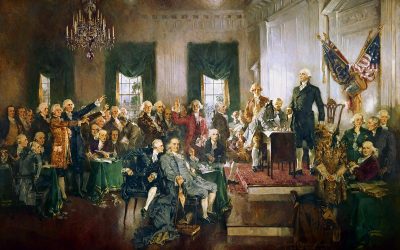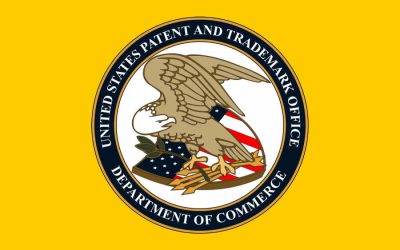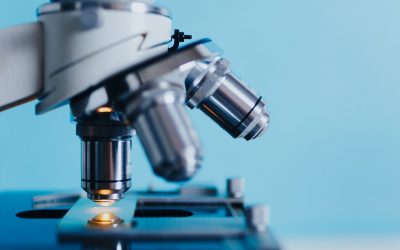The Founding Fathers’ moral achievement in securing patents and other intellectual property rights in U.S. law.
Adam Mossoff
The Constitutional Protection of Intellectual Property
Both Founding Era sources and 19th-century court decisions, official statements, and commentaries confirm that intellectual property rights are property as a matter of basic legal doctrine and constitutional principle.
The Injunction Function: Why It Matters to Secure Patents as Property Rights
Patents secure the fruits of productive labors of the innovators who create the new products and services that drive economic growth, create jobs, and ultimately contribute to a flourishing society.
Intellectual Property in an Innovation Economy
How IP is a property right, how it functions as a property right in a free market, and how legally, historically, and economically, IP is essential to a thriving economy and flourishing society.
Patents Are Property Rights
Ayn Rand’s genius was to recognize that man’s mind is his basic means of survival, that production is the application of reason to the problem of survival, and thus that all property is logically intellectual property at root.
Why We Don’t Want to Import Weak Intellectual Property Systems
Trump has been a champion of protecting U.S. innovators from the theft of their inventions by foreign countries, such as China. However, his executive order takes the U.S. in the wrong direction. It would import not just foreign price controls, but also weaker foreign patent systems.
Radical OSTP Proposal Would Undermine American Research and Sacrifice American Intellectual Property
The Trump Administration should not permit the Office of Science and Technology Policy (OSTP) to eviscerate the key constitutional and economic function of copyright law by forcing U.S. intellectual property owners to give away their copyrighted works for free to China and the rest of the world.
Patents and Copyrights Matter
Adam Mossoff interview with Elan Journo on patents and copyrights.
Congress Should Reform Patent Eligibility Doctrine to Preserve the U.S. Innovation Economy
It is time for Congress to restore balance to a patent system that has historically secured the fruits of inventive labors with reliable and effective property rights in inventions and discoveries.
Why Should Business Leaders Care about Intellectual Property?
In this talk, law professor Adam Mossoff explains Ayn Rand’s radical justification for intellectual property rights: that all property is — at root — intellectual.
The Rise and Fall of Property Rights in America
Adam Mossoff traces the rise and fall of property rights in America.
The Smartphone Wars and “Patent Trolls”
There are widespread complaints today that the “patent system is broken” and that the “smartphone wars” and “patent trolls” are killing innovation. Yet patented innovation has revolutionized our lives today—tablet computers, smartphones and antiviral drugs are just a few of these modern marvels. How to make sense of this contradiction?
Open Letter: The Venue Act and The Rights of Inventors
An open letter sent to Congress about the Venue Act, which is another attempt to deny the rights of inventors.
Teslas’s New Patent Policy: Long Live the Patent System!
In plain English, here’s the deal that Tesla is offering to manufacturers and users of its electrical car technology: in exchange for using Tesla’s patents, the users of Tesla’s patents cannot file patent infringement lawsuits against Tesla if Tesla uses their other patents.
No “Patent Troll” Litigation Problem
With the future of innovation at stake, it is not crazy to ask that before we make radical, systemic changes to the patent system that we have validly established empirical evidence that such revisions are in fact necessary or at least would do more good than harm.
Adam Mossoff’s Senate Testimony on Patent Assertion Entities, Demand Letters and Patent Litigation
There certainly are bad actors, deceptive demand letters, and frivolous litigation in the patent system. The important question, though, is whether there is a systemic problem requiring further systemic revisions to the patent system.
The Myth of the “Patent Troll” Litigation Explosion
Unfortunately, the complaints today about today’s patent litigation crisis arise more from unchecked intuitions about what feels like a bad situation, from unrealistic assumptions about how much certainty we can achieve in the patent system, and from emotionally-compelling anecdotes about innovators running into trouble with patents.
How Copyright Drives Innovation in Scholarly Publishing
This basic economic fact—dynamic development of innovative distribution mechanisms require substantial investment in both people and resources—is what makes commercialization an essential feature of both copyright policy and law (and of all intellectual property doctrines).
The “Common Law Property” Myth in the Libertarian Critique of IP Rights (Part 2)
IP rights have developed in the same way as property rights in land with both legislatures and courts creating, repealing, and extending doctrines in an important institutional and doctrinal evolution of these property rights securing technological innovation and creative works.
The “Common Law Property” Myth in the Libertarian Critique of IP Rights (Part 1)
This oft-made contrast by libertarians between so-called “common law property in land” versus “statutory IP” is a myth that has no basis in the reality of how common law property rights in land evolved in England and then in the United States of America.
Like this content? Subscribe to support our work — it's free.
Read by students, professors, and citizens, Capitalism Magazine provides over 9,000 free to read articles and essays from pro-reason, individual rights perspective. 100% independent.
No spam. Unsubscribe anytime.





